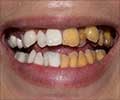A portable dental suction device, an inexpensive, battery-powered version of the vacuum system commonly used in dentists' offices to remove blood and saliva from a patient's mouth has been designed by Rice University students.
An issue faced by most dentists across the world, especially those who travel to far flung villages, can't afford expensive systems or have only limited access to electricity - this device is nothing short of a blessing.Faculty at the University of Texas Dental Branch-Houston (UTDB-H) have long been aware of the need for a portable dental suction device and turned to Rice students to see how they could help.
Bioengineering majors Brian Benjamin, Jaime Wirth, Carmen Perez and Tiffany Kim and biochemistry and cell biology major Jessica Ma - who belong to the team 'Pearly Whites' have assembled a foot-operated portable system that will go on the road with UTDB-H faculty this summer for testing by rural Texas dentists.
"I can't adequately describe how motivated and enthusiastic the students were this year," said Dan Bentley, an assistant professor of restorative dentistry at UTDB-H and one of the team's advisers. "It was amazing. I think their independent effort and willing attitude have produced exactly the desired outcome for the project."
"The students evaluated the need described by their mentors at the dental branch and created a viable solution that is ready to field test," said co-adviser Maria Oden, professor in the practice of engineering education and director of Rice's Oshman Engineering Design Kitchen, where the device was designed.
"The system can run without direct electrical service and should protect patients from swallowing debris during procedures, save dentists time as they perform these procedures and greatly reduce the amount of waste the team needs to dispose of-all at low cost."
Advertisement
"We would turn it on, suction 500 milliliters of water, turn it off and leave it for three minutes - and then do it again," Wirth said. "With intermittent use, we really don't see power as a problem at all."
Advertisement
Bentley certainly likes what he's seen so far. "These young bioengineers worked together, modifying and listening to our input to complete a real working prototype we can easily use," he said.
Source-ANI
RAS










